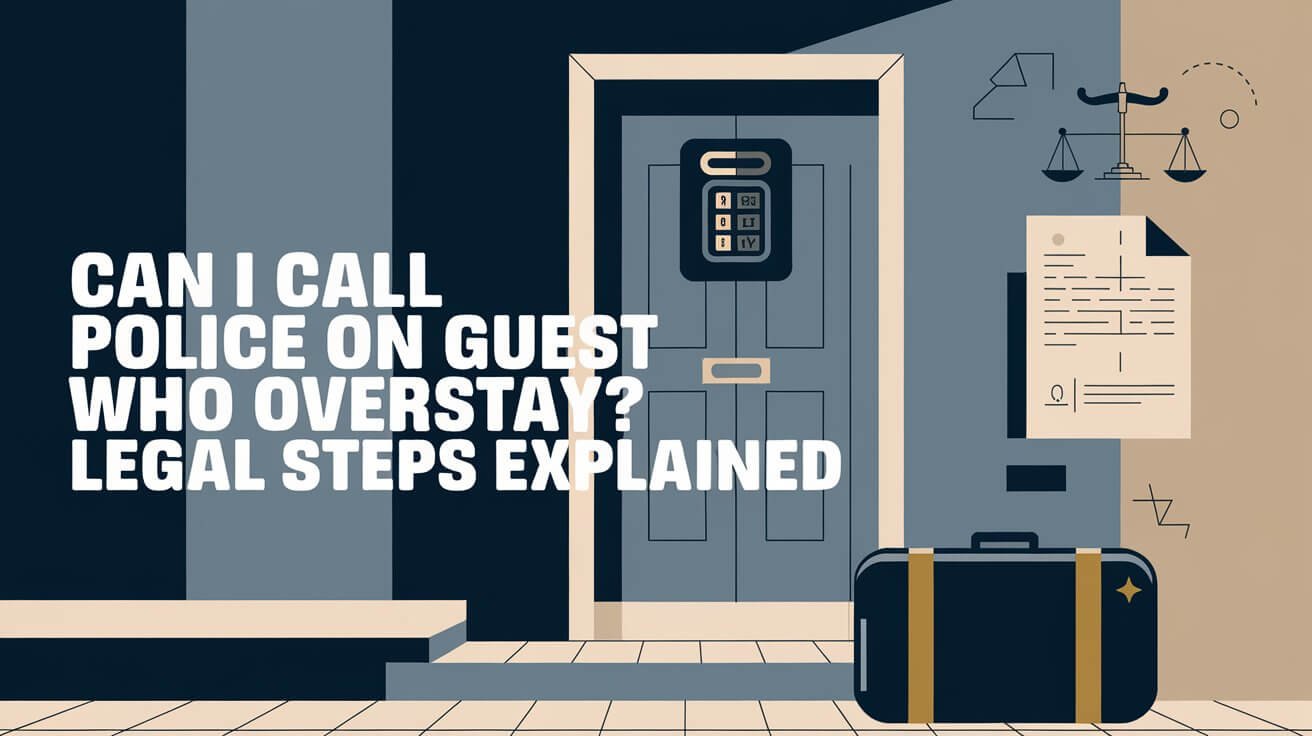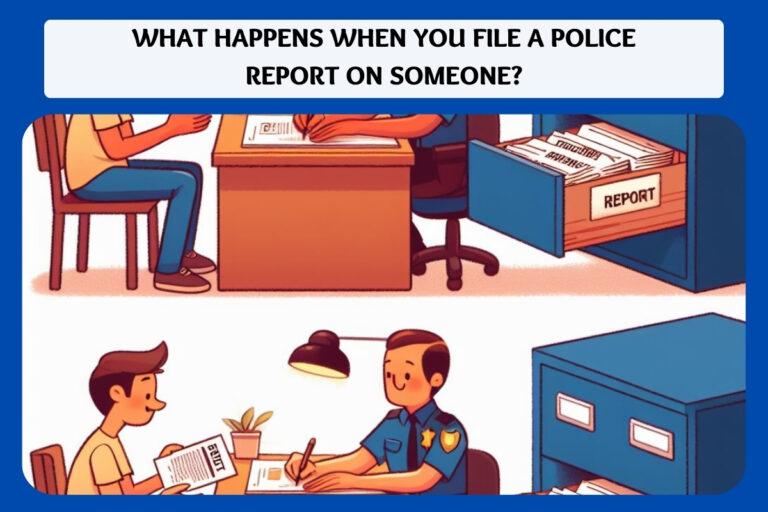Can I Call Police On Guest Who Overstay? Legal Steps Explained

Dealing with guests who won’t leave can be tough for homeowners. It’s key to set clear rules and time limits to prevent problems. Knowing your rights as a homeowner is important, too, when dealing with guests who overstay.
Guests who overstay can be a big issue. They might try to stay longer by being manipulative. Knowing how to handle this and set boundaries is essential. Your legal rights as a homeowner can guide you, including calling the police if needed.
Legal Rights of Homeowners and Property Owners
As a property owner, knowing your legal rights is key. These rights vary by state but most states help tell guests from tenants. In Utah, for example, owners can ask police to remove long-term guests without going to court, thanks to Utah Code Section 76-6-206.4.
It’s important to know the difference between guests and tenants. Guests stay for 48 hours or more without paying and aren’t family. Tenants, on the other hand, have a rental agreement or pay to live there. This difference helps property owners understand their rights better.
Property Owner Protections Under State Law
Property owners can decide who stays on their property and for how long. In Colorado, entering a home without permission is trespass. Police in Colorado are careful about removing guests to avoid legal trouble.
Difference Between Guests and Tenants
The main differences between guests and tenants are:
- Nature of the invitation
- Duration of stay
- Payment of rent
- Any agreements influencing the guest’s rights
Your Rights as a Property Owner
Knowing your rights as a property owner is vital. Understanding the difference between guests and tenants helps you handle unwanted guests. This knowledge protects your property rights.
| State | Guest Definition | Tenant Definition |
|---|---|---|
| Utah | Staying for 48 hours or longer with no exchange of value | Has a rental agreement or has provided value in exchange for residency |
| Colorado | Entering or remaining in a home or building without permission | Has a rental agreement or has provided value in exchange for residency |
Signs Your House Guest Has Crossed Legal Boundaries
Recognizing when a house guest has overstayed their welcome is essential for maintaining a peaceful home. Etiquette expert Lisa Mirza Grotts says guests should stay for two nights and three days. If they stay longer, it shows disrespect for the agreed-upon time and rules.
Signs of unwanted guests include not paying for household expenses and ignoring house rules. For example, drinking all the wine in one day shows bad behavior. Guests should pay attention to when it’s time to leave, to avoid making hosts uncomfortable.
To keep a good relationship with guests, set clear rules and expectations. Talk about how long they can stay, what chores they’ll do, and the house rules. This way, hosts can avoid legal issues and keep everyone happy.
Some key signs that a house guest has crossed legal boundaries include:
- Disregard for agreed-upon stay durations
- Failure to contribute to household expenses
- Disregard for house rules and social cues
- Lack of respect for the host’s personal space and property
Spotting these signs and setting clear rules, hosts can avoid legal problems. This ensures a peaceful living space for everyone.
Documentation Required Before Police Involvement
When dealing with unwanted guests, keeping detailed records is key. This is in case you need to involve the police. These records can act as evidence to support your claims. They help solve the problem quickly.
Keeping a timeline of your interactions with the guest is also important. This includes dates of arrival and departure. It also includes any agreements or notices given to the guest. And any incidents or issues that happened during their stay.
Types of Documentation
- Written notices, such as eviction notices or notices to vacate
- Communication records, including emails, letters, or text messages
- Timeline records of interactions with the guest
- Property evidence, such as photos or videos of damage or trespassing
Having this documentation ready can avoid disputes and long legal battles. Law enforcement may ask for it to help solve the issue. So, it’s vital to keep accurate and detailed records.
Direct Communication Strategies With Unwanted Guests
Dealing with unwanted guests requires effective communication. About 70% of strategies use subtle hints and setting boundaries. This helps guests leave without confrontation. The other 30% use direct and assertive methods to tell guests it’s time to go.
Being firm but respectful is key in direct communication. This way, you avoid misunderstandings and make it clear they must leave. Some good strategies include:
- Clearly stating house rules and expectations
- Setting boundaries and being firm but respectful
- Using “I” statements to express feelings and avoid blame
- Listening actively to the guest’s concerns and responding thoughtfully
Also, about 20% of tactics suggest involving friends to help signal it’s time to leave. By mixing these strategies, you can communicate effectively with unwanted guests. This approach helps prevent conflicts and ensures a peaceful resolution.
| Strategy | Percentage |
|---|---|
| Subtle hints and scheduling activities | 70% |
| Direct and assertive methods | 30% |
| Involving third parties | 20% |
Can I Call Police on Guest Who Overstay: Legal Process
Dealing with unwanted guests can be tricky. It’s key to know the legal steps and how police respond. In Utah, a 2017 law lets homeowners call the police if guests overstay. But, they must first ask the guests to leave.
First, you must tell the guest to leave, either in person or in writing. The police then give the guest time to gather their things. Guests can fight back by showing a rental agreement or proving they were allowed to stay.
Key Considerations for Involving Law Enforcement
- Notice to leave the premises can be oral or in writing
- Police must allow the guest time to collect their belongings
- Guests can defend themselves by showing a written rental agreement or proving an oral agreement exists
Knowing the legal steps and police actions is important when guests overstay. By understanding when to call the police, homeowners can handle these situations better. Always follow the right steps and get legal help if needed for a fair outcome.
| State | Law Regarding Long-Term Guests |
|---|---|
| Utah | Allows homeowners to call police on long-term guests who overstay without permission |
Emergency Situations and Immediate Action Steps
In emergency situations with unwanted guests, it’s vital to act fast. This is to protect yourself and your property. This might happen if the guest damages your stuff or threatens your safety.
Examples of emergencies include a guest tripping the power and causing damage. Or, a guest making threats against you or your family. In these cases, your safety comes first, and you must act quickly.
Here are some steps you can take in emergency situations with unwanted guests:
- Contact local law enforcement if you feel threatened or if the guest is causing damage to your property.
- Document any damage or incidents, including taking photos and videos as evidence.
- Seek support from friends, family, or a local crisis center if you’re feeling overwhelmed or scared.
Remember, your safety is the most important thing in emergency situations with unwanted guests. Don’t wait to take action to protect yourself and your property.
| Emergency Situation | Immediate Action |
|---|---|
| Guest causing damage to property | Contact law enforcement, document damage |
| Guest making threats | Contact law enforcement, seek support |
| Guest overstaying welcome | Communicate clearly with guest, set boundaries |
Civil Court Options and Legal Remedies
Homeowners have many ways to deal with unwanted guests through civil court. The eviction process can be long and complicated. But, it’s often needed to protect your property and rights. In the U.S., eviction laws differ by state. Yet, most states require a 30-day notice before starting a lawsuit against friends or family.
Reasons for eviction include property damage, illegal activities, and abuse. If talking it out doesn’t work, homeowners might need to go to court. They could file for eviction, get a restraining order, or take a case to small claims court.
Here are some important steps in the eviction process:
- Filing a “wrongful detainer” action in District Court against the guest or squatter who refuses to leave the property
- Serving the defendant with a summons, which includes a date for a court appearance
- Requesting a jury trial, which can move the case to the circuit court
- Seeking a court order to remove the person unlawfully in possession, as well as monetary damages for harm suffered, court costs, and attorneys’ fees
Between 5%-8% of renters face eviction each year, says the U.S. Accountability Office. Knowing your civil court options and legal remedies can help homeowners protect their property rights.
| State | Eviction Notice Requirement |
|---|---|
| Nevada | 5-day notice |
| Most other states | 30-day notice |
Prevention Methods for Future Situations
To avoid unwanted guests, it’s key to use prevention methods. Screen guests carefully to lower the risk of problems. Also, set clear house rules to avoid misunderstandings.
Keeping communication open with guests is vital. This helps prevent issues and makes their stay better. Being proactive can help avoid legal problems and unwanted guests. For example, using Airbnb can make it easier to handle overstay issues.
Some important prevention methods include:
- Screening guests through identity checks and reviews
- Setting clear house rules
- Keeping communication open with guests
- Using Airbnb for easier guest management
Using these methods, homeowners can keep their space safe and secure. This is very important to avoid legal issues and ensure a pleasant stay for everyone.
Wrap-Up Thoughts
Understanding your legal rights as a property owner is key when dealing with unwanted guests. Being proactive and clear in communication helps you protect your property rights. Your home is your safe space, and you decide who enters it.
Stay informed, document any issues, and be ready to act. This might mean talking to the guest or calling the police. A proactive approach to protecting your property rights helps avoid stress and hassle.
You are in charge of your home. With the knowledge from this guide, you can handle tough situations. By knowing your rights and acting, you can protect your property rights. This way, your home remains a place of comfort and peace.
Reader Questions
What are the legal rights of homeowners and property owners when dealing with unwanted guests?
Homeowners and property owners have legal rights. They can decide who stays on their property and for how long. It’s key to know the difference between guests and tenants.
How can I identify when a house guest has crossed legal boundaries or become an unwanted guest?
Signs of an unwanted guest include disrespect for stay times and not helping with expenses. They also ignore house rules.
What documentation is required before involving the police when dealing with unwanted guests?
Keep written records of talks and property damage. This helps prove your case against unwanted guests.
What communication strategies should I use when dealing with unwanted guests?
Be direct and clear. Set boundaries and tell them they must leave. This can solve the problem.
What is the legal process for involving law enforcement when dealing with unwanted guests?
Know when to call the police. Understand how they respond and what legal help is available.
How do I handle emergency situations with unwanted guests?
In emergencies, like damage or threats, act fast. Protect yourself and your property first.
What civil court options and legal remedies are available for dealing with unwanted guests?
You can go to court for eviction or restraining orders. Small claims court can also help.
How can I prevent future situations with unwanted guests?
Screen guests before they come. Set clear rules and talk openly. This can stop problems before they start.






